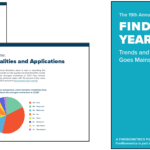 A recent academic paper that was highly critical of the use of facial recognition technology at airport departure gates prominently featured “factually incorrect and misleading statements”, argues a new analysis from the International Biometrics + Identity Association (IBIA). The IBIA assessed the Georgetown University Center on Privacy & Technology’s “Not Ready for Takeoff: Face Scans at Airport Departure Gates” publication in its new white paper, “Setting the Record Straight on Face Scans in Biometric Exit“.
A recent academic paper that was highly critical of the use of facial recognition technology at airport departure gates prominently featured “factually incorrect and misleading statements”, argues a new analysis from the International Biometrics + Identity Association (IBIA). The IBIA assessed the Georgetown University Center on Privacy & Technology’s “Not Ready for Takeoff: Face Scans at Airport Departure Gates” publication in its new white paper, “Setting the Record Straight on Face Scans in Biometric Exit“.
Among other criticisms, the IBIA argues that the CPT “misconstrued” data from the National Institute of Standards and Technology (NIST), suggesting that facial recognition technology has a 96 percent accuracy rate, whereas “[a]ctual performance of modern algorithms against a gallery size equal to or slightly greater than a plane manifest is 98% to 99%.” The IBIA also asserts that contrary to the Georgetown report’s implications that technological faults have delayed the widespread implementation of airport facial recognition, “the real impedances have been in reconciling airport infrastructure needs, obtaining stakeholder buy-in, and funding.” And the IBIA insists that funding for such programs does not taxpayers, but rather that it “has been derived from increases in visa fees (borne by visa applicants) and public-private partnerships” between the Customs and Border Protection Agency and airlines and airports.
In addition to these and other specific disagreements as to the representation of facts, the IBIA’s white paper also questions academic rigor of the CPT more broadly, noting that the report’s authors didn’t reach out to the IBIA for input and only sent its finished paper to the CBP 24 hours before it was published; and that it doesn’t identify the paper’s peer reviewers – an omission that is “unusual in academic circles where identifying peer reviewers is de rigueur.”
The critique of the critique represents the latest salvo in the ongoing friction between proponents of biometric border screening and the privacy and civil rights advocates who oppose it. And while the debate rages on, the CBP and its partners continue to expand their biometric screening program to more airports and other border checkpoints throughout the country, pursuant to its congressional mandate to establish a Biometric Exit program for the US.
–
January 23, 2018 – by Alex Perala








Follow Us